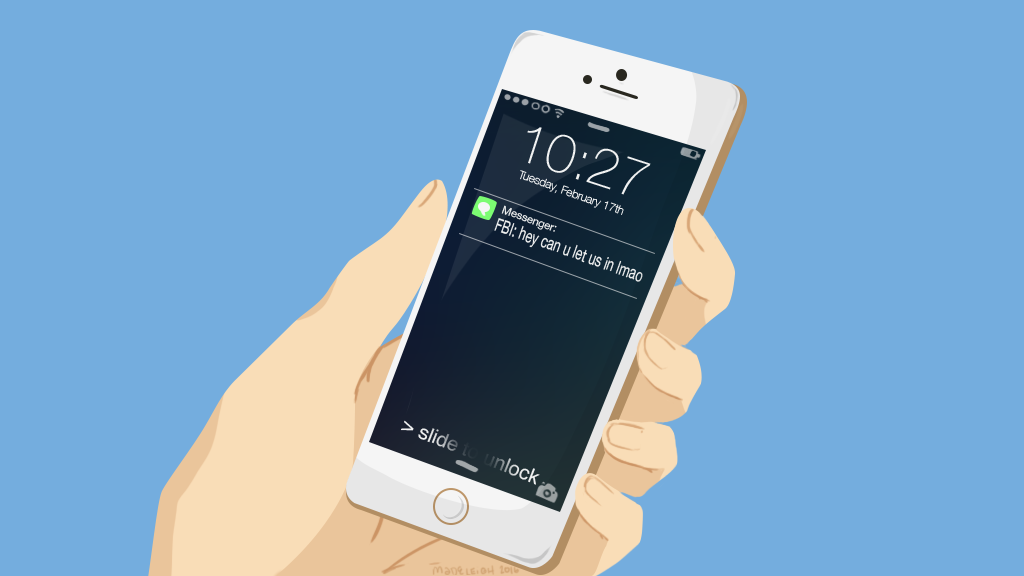Apple vs the FBI: A Complicated Mess
by Dev Sheth | published Mar. 28th, 2016
In the latest display of the growing chasm between technological advances and regulatory policy, Apple and the FBI have locked heads over a court order that attempts to force Apple to help the FBI obtain data from the iPhone 5C used by Syed Farook, one of the shooters involved in the San Bernardino attack on Dec. 2, 2015.
In response to the court order, Apple CEO Tim Cook wrote an open letter discussing the issue and justifying Apple's opposition to the order. Cook cited Apple's cooperation in the FBI investigation, stating that "when the FBI has requested data that’s in our possession, we have provided it." What the FBI is asking Apple to provide now is "something we simply do not have," Cook continued. Specifically, the FBI has asked Apple to create a new version of the operating system on the iPhone that would bypass the security measures in the current version of the OS on the shooter's phone. Apple's argument is that creating such a software compromises the security of all iPhones, even if the FBI claims that it has no intention of using the tool for any other purpose than to unlock the shooter's phone.
Predictably, the American Civil Liberties Union (ACLU) has objected to the FBI's claims. The whistleblower Edward Snowden has weighed in as well. Speaking at Common Cause's Blueprint for Democracy event via video conference, Snowden highlighted the FBI's claims that Apple has the "exclusive technical means" to unlock the phone, saying "Respectfully, that's bullshit." Both the ACLU and Snowden, among others, hold the view that obtaining the data the FBI seeks isn't as difficult as they make it out to be, and that the FBI is using the terrorism aspects as a platform to set a dangerous legal precedent for the future.
Most tech giants have rallied behind Apple as well, filing amicus briefs in Apple's support. Also in support of Apple are law professors, human rights groups, internet privacy advocates and many more. The obvious concern for the IT companies is that were Apple to be forced to comply, it would set a dangerous precedent for the future. There could be nothing to stop the FBI from using the same technological tactics again, and with the Snowden saga fresh in people's minds, it is easy to see how privacy vulnerabilities might affect IT businesses.
Microsoft co-founder Bill Gates made headlines in a Financial Times interview that suggested he was on the FBI's side on the issue.
"This is a specific case where the government is asking for access to information. They are not asking for some general thing, they are asking for a particular case,” Gates said. However, he claimed in a later interview with Bloomberg TV that he was misunderstood. "I was disappointed because that [the Financial Times headline] doesn't state my view on this," Gates said, before defending his stance that the issue wasn't as black and white as people presumed. "I do believe there are sets of safeguards where the government shouldn't have to be completely blind," Gates continued.
Of course, there is the argument that Apple's motivations have more to do with business than with principles, in that privacy rights are increasingly at the forefront of cyber security concerns. Hacking incidents have been on the rise over the past few years, and every new hacking scandal only adds to the environment of fear. The iPhone, like all its counterparts, has its vulnerabilities. While the FBI and the US government may have to go through the legal channels to get companies like Apple to provide the data they seek, the same restrictions do not apply to external counter-intelligence agencies in the employ of rival governments.
This doesn't even begin to take into account black-hat hackers, trawling the web for vulnerable data stores that translate to a large amount of money on the Dark Web. Building a backdoor into its iOS would probably be the easiest thing Apple could do to guarantee a data breach in the future. The past few years have been proof that if there's a vulnerability to be found, it is a question of when, and not if, the hackers will find it.
In another court battle between Apple and the FBI, a federal judge in New York ruled in favor of Apple on the same principle the FBI is using in the San Bernardino case. In the aftermath of the verdict, the issue has threatened to turn ugly with both sides exchanging accusations of devious motives. The FBI claims that Apple has previously complied to at least 70 similar requests, and that the company's abrupt reversal stems from the reservations of the federal judge hearing the case, Magistrate James Orenstein. Apple, meanwhile, has claimed that the FBI's request would thoroughly undermine fundamental principles of the Constitution. While this particular case is very different from the one in California, it sets a precedent. It is also helpful that the technological demands that Apple would be put under in the California case would be of far greater complexity than in the New York case.
While the case gets settled in the courts, it is important to have this debate about privacy and security. The issue is clearly a complex one and it is up to us to try to bridge the gap between technology and policy. Like the technology we love so dearly, this problem isn't going anywhere.



